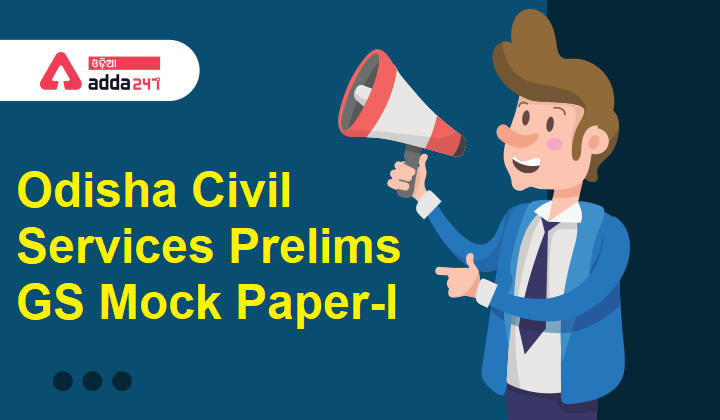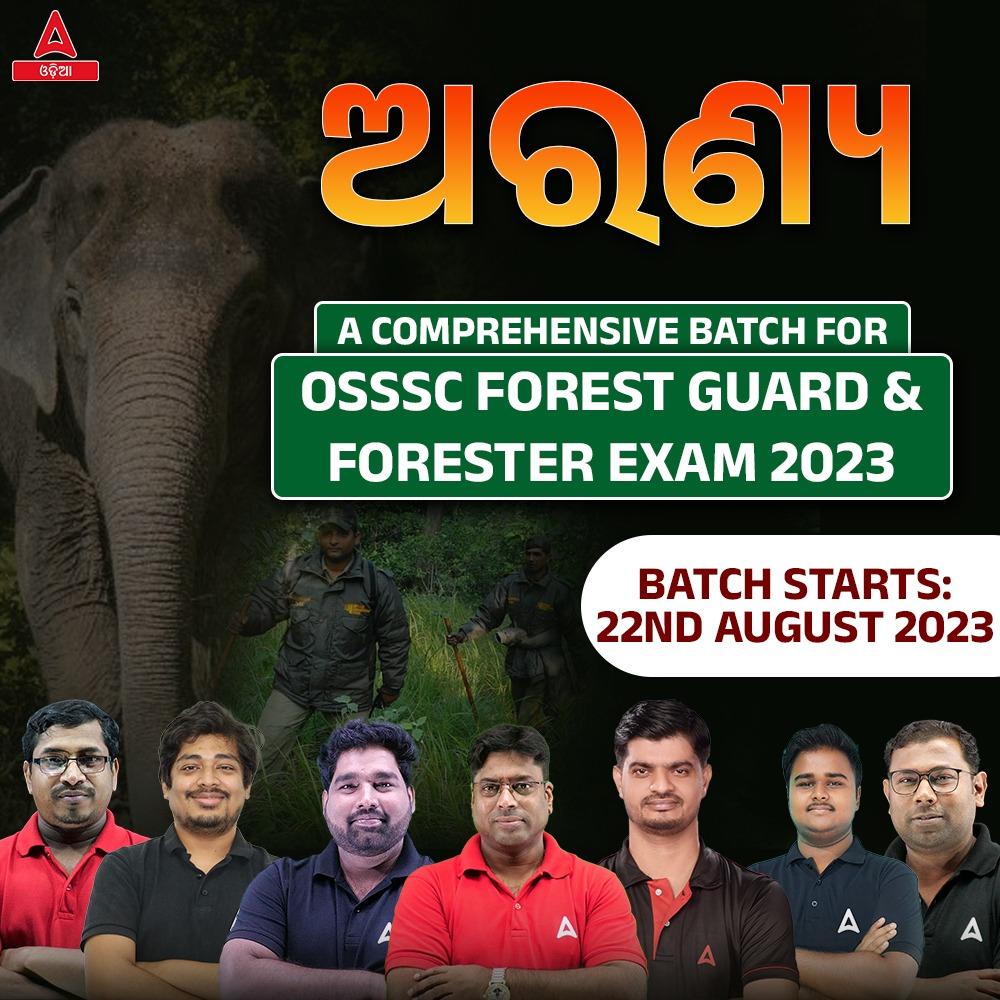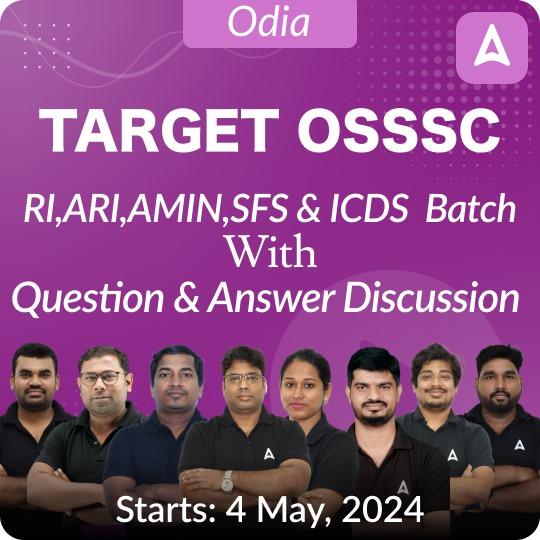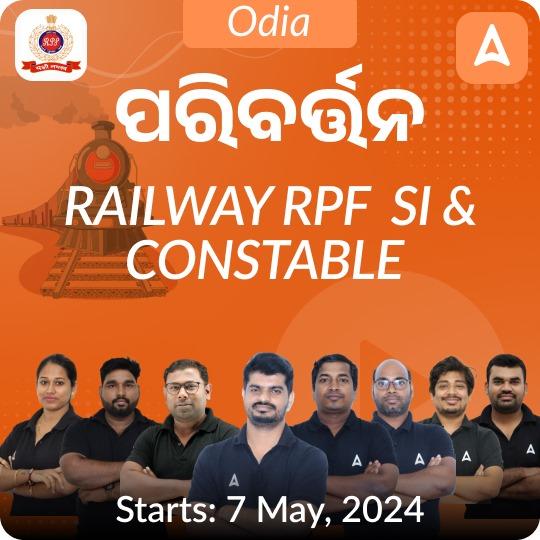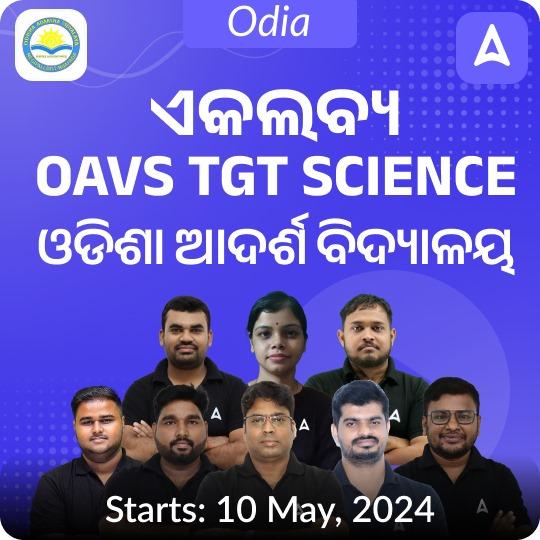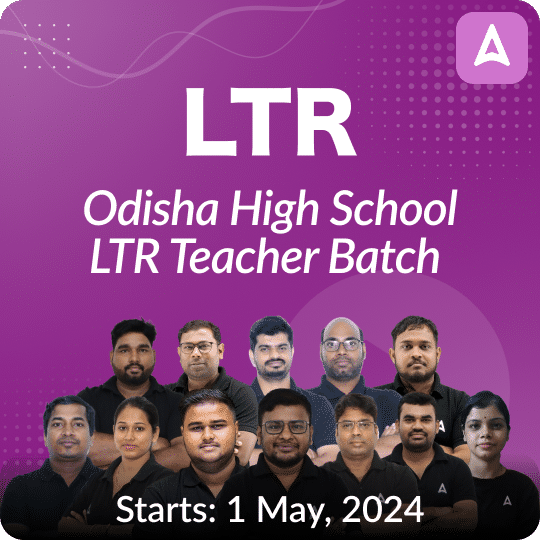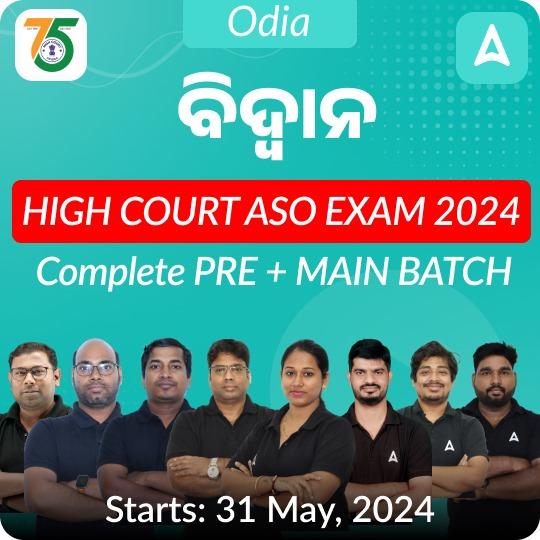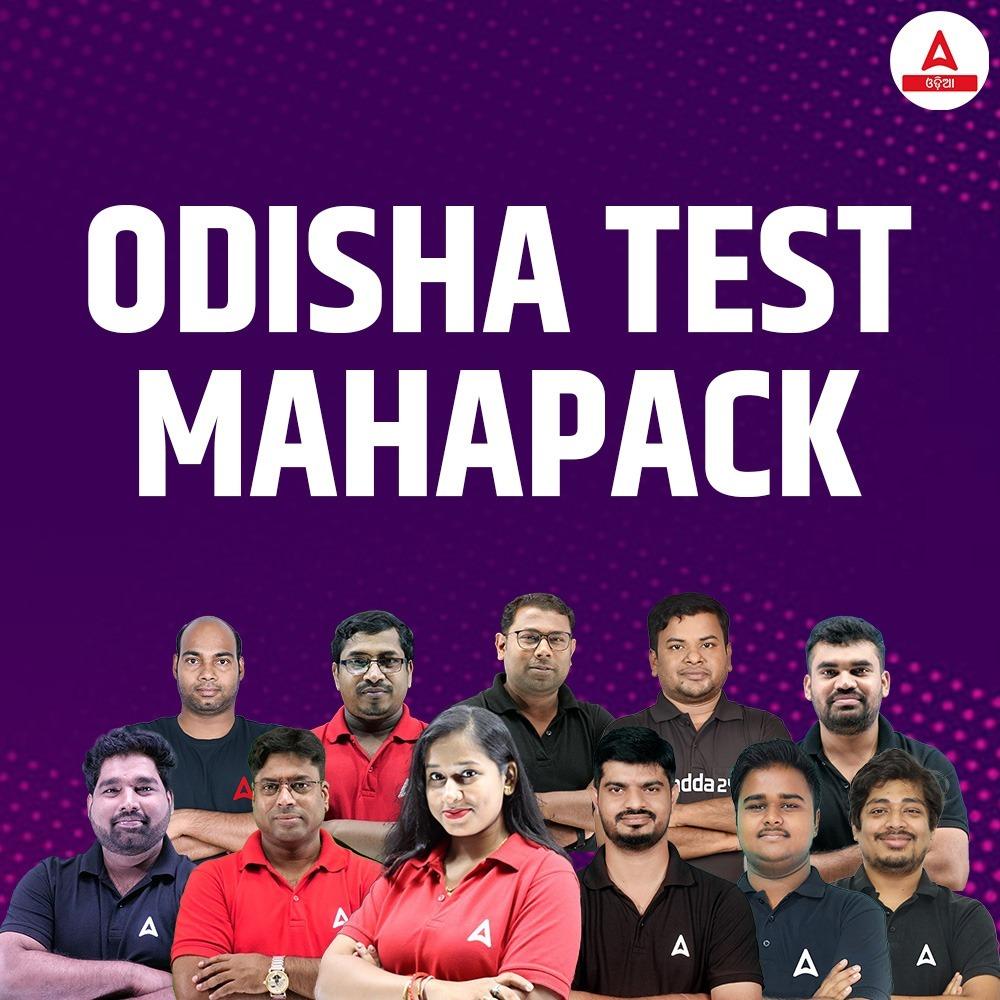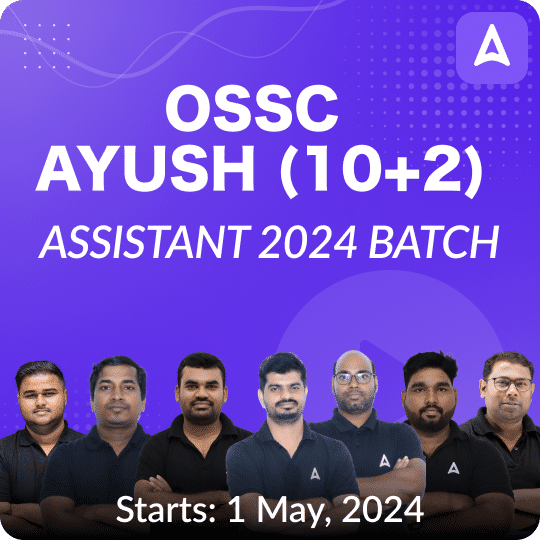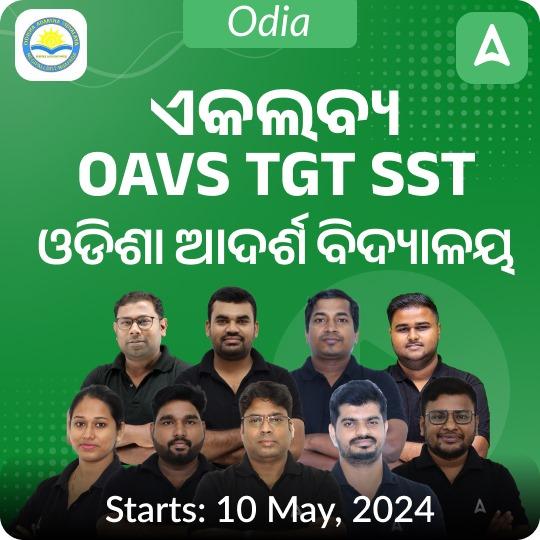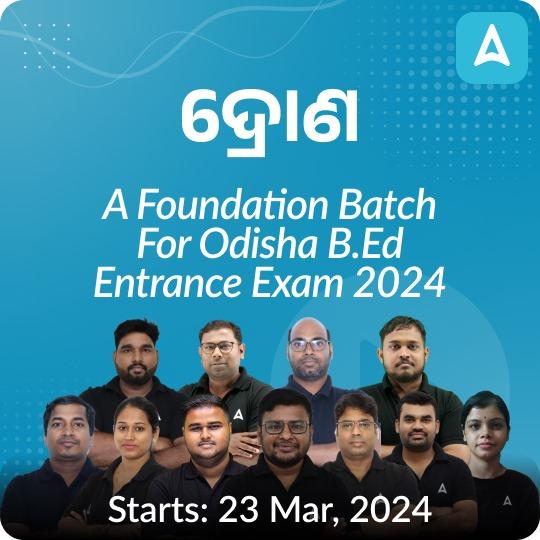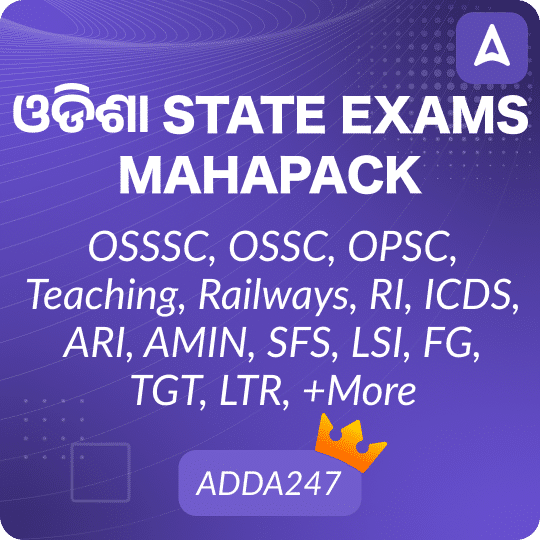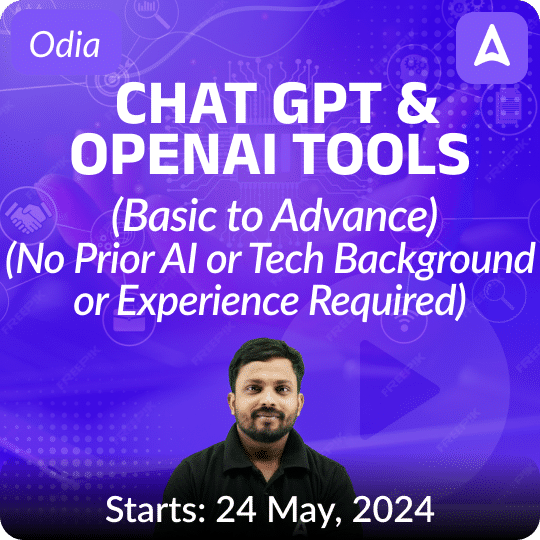With Adda 247 Odia’s General Awareness quizzes, you can build a solid foundation in General Awareness for the OPSC OCS Exam. Our quizzes are designed to enhance your knowledge, improve your retention and boost your confidence. Join us in your journey to success and excel in your OPSC OCS Exam!
Q1. In the context of vaccines manufactured to prevent COVID-19 pandemic, consider the following statements:
- The Serum Institute of India produced COVID-19 vaccine named Covishield using mRNA platform. 2. Sputnik V vaccine is manufactured using vector based platform.
- COVAXIN is an inactivated pathogen based vaccine.
Which of the statements given above are correct?
(a) 1 and 2 only
(b) 2 and 3 only
(c) 1 and 3 only
(d) 1, 2 and 3
S1.Ans.(b)
Sol.
- Covishield produced by the Serum Institute of India, is a recombinant, replication-deficient chimpanzee adenovirus vector encoding the SARS-CoV-2 Spike (S) glycoprotein. Following administration, the genetic material of part of corona virus is expressed which stimulates an immune response. So, statement 1 is not correct.
- Sputnik V vaccine is developed by Moscow’s Gamaleya Institute. It is based on non-replicating human adenovirus vector platform. So, statement 2 is correct.
- COVAXIN is a whole-virion inactivated coronavirus vaccine which is also used to manufacture vaccines like Influenza, Rabies and Hepatitis- A. It is manufactured by Bharat Biotech. So, statement 3 is correct.
- In mRNA vaccines, the messenger RNAs trigger an immune response in our bodies which in turn produces antibodies and thus protects us from the infection. In India, the CSIR-Centre for Cellular and Molecular Biology researchers are currently testing a mRNA vaccine candidate against Covid-19. Therefore, option (b) is the correct answer.
Q2. Measuring land and keeping land records at village level is the main work of which of the following?
(a) Patwari
(b) Sarpanch
(c) Tehsildar
(d) Panchayat Secretary
S2.Ans.(a)
Sol.
Option a is the correct answer Measuring land and keeping land records is the main work of the Patwari. The Patwari is known by different names in different states – in some villages, such officers are called Lekhpal, in others Kanungo or Karamchari or Village Officer, etc. Each Patwari is responsible for a group of villages. The Patwari maintains and updates the records of the village. The Patwari is also responsible for organizing the collection of land revenue from the farmers and providing information to the government about the crops grown in this area. All states in India are divided into districts. For managing matters relating to land, these districts are further subdivided. These sub-divisions of a district are known by different names such as tehsil, taluka, etc. At the head is the District Collector and under him/her are the revenue officers, also known as tehsildars. They have to hear disputes. They also supervise the work of the Patwaris and ensure that records are properly kept and land revenue is collected
Q3. Consider the following statements regarding curative petition
- It is the last judicial resort available for redressal of grievances in court which is used only in rare cases that such petitions
- It is not mentioned under the Indian constitution.
Which of the statements given above is/are correct?
- 1 only
- 2 only
- Both 1 and 2
- Neither 1 nor 2
S3.Ans.(c)
Sol.
Curative petitions have been filed in the Supreme Court by two convicts in the Nirbhaya case. The petitions come just days after a Delhi sessions court scheduled the execution of the four convicts at Tihar Jail.
It is the last judicial resort available for redressal of grievances in court which is normally decided by judges in-chamber. It is only in rare cases that such petitions are given an open-court hearing.
The concept of the curative petition was first evolved by the Supreme Court of India in the matter of Rupa Ashok Hurra vs. Ashok Hurra and Anr. (2002) where the question was whether an aggrieved person is entitled to any relief against the final judgment/order of the Supreme Court, after the dismissal of a review petition.
It is based on the interpretation of Article 137, which provides that in the matter of laws and rules made under Article 145, the Supreme Court has the power to review any judgment pronounced (or order made) by it. Thus, it is not mentioned in the question directly
Q4. Consider the following statements regarding SWAMIH Fund
- The fund was set up to provide last mile funding to stuck affordable housing projects.
- Housing projects that have been declared non-performing assets (NPAs) or had been admitted for insolvency proceedings are not eligible for the funding under this.
- This fund is managed by the Ministry of finance
Which of the statements given above is/are correct?
- 1 and 2
- 2 and 3
- 1 only
- 1,2 and 3
S4.Ans.(c)
Sol.
In November 2019, the central government launched the SWAMIH Investment Fund with an estimated fund size of Rs 25,000 crore to help complete over 1,500 stalled housing projects and provide last-mile funding to stuck affordable housing projects, including those that have been declared non-performing assets (NPAs) or had been admitted for insolvency proceedings. The move was to help 4.58 lakh housing units across the country. Only RERA-registered projects with a positive net worth are to be provided funding.
The Fund is managed by SBI Cap ventures. It is available only for projects that have completed at least 30% of the construction required.
Q5. Consider the following statements with respect to Salt Flats
- A salt flat forms from a natural water body whose recharge rate is lower than the evaporation rate.
- They reflect sunlight strongly and thus appear bright.
- Salar de Uyuni in Bolivia is the largest known salt flats in the world.
Which of the statements given above are correct?
- 1 and 2 only
- 1 and 3 only
- 2 and 3 only
- 1, 2 and 3
S5.Ans.(d)
Sol.
Salt Flats
- A salt flat is a natural landscape in which a large area of flat land is covered by salt.
- Salar de Uyuni in Bolivia is the world’s largest known salt flat and also contains more than half of the planet’s lithium reserves.
- A salt flat forms from a natural water body whose recharge rate is lower than the evaporation rate.
- The salinity is highest near the top of the soil and decreases towards the bottom.
- If the rate of salt deposition on the surface is sufficiently high, the denser groundwater will sink down and the less-saline, less-dense groundwater will rise to the top.
- This body of descending and ascending water is called a convection cell
Q6. Consider the following statements with reference to Magnetic Levitation Technology :
- It uses both magnetic attraction and repulsion between magnets to operate high speed trains.
- Vande Bharat trains in India is using this technology for its high speed operation.
Which of the statements given above is/are not correct ?
(a) 1 only
(b) 2 only
(c) Both 1 and 2
(d) Neither 1 nor 2
S6.Ans.(a)
Sol.
Vande Bharat Express is a India’s first Semi High Speed Train, which will provide passengers with aircraft like travelling experience and advanced state-of-the-art safety features including Kavach technology – an indigenously developed Train Collision Avoidance System, Speed, Safety and Service are the hallmarks of this train.Vande Bharat did not use Maglev Technology for its high speed operation. Still in India, Maglev Technology has been under consideration, it is not yet been used. So, Statement 2 is not correct.
Q7. The Indian constitution has provisions for establishment of tribunals in the country. In this
context, which of the following statement regarding tribunal is notcorrect?
(a) There was no provision regarding tribunals during the commencement of constitution
(b) The provisions regarding tribunal was added by constitution 42nd amendment act, 1976
(c) The constitution empowers the President to provide for the establishment of tribunals
(d) The State Administrative Tribunals are established by the union government
S7.Ans.(c)
Sol.
The original Constitution did not contain provisions with respect to tribunals. Therefore, there was no provision regarding tribunals during the commencement of the Constitution
The 42nd Amendment Act of 1976 added a new Part XIV-A to the Constitution entitled ‘Tribunals.’
In 1976, the Constitution of India inserted Articles 323A and 323B through the 42nd Amendment.
- Article 323A empowers the Parliament to constitute administrative tribunals at the central and state levels for adjudication of matters related to recruitment and conditions of service of public servants (established through the 42nd Constitutional Amendment of the Constitution).
- Article 323B specified certain subjects such as taxation and land reforms for which Parliament or state legislatures may constitute tribunals by enacting a law. Hence, the Constitution does not empower the President to provide for the establishment of tribunals.
The Administrative Tribunals Act of 1985 empowers the Central government(union government) to establish the State Administrative Tribunals (SATs) at the specific request of the concerned state governments. So, Option (c) is correct.
Q8. The UN identifies three criteria for a country to be classified as a Least Developed Country LDC . Which of the following is not one of those?
- It must perform poorly on a composite human assets index based on indicators including nutrition, health and education.
- The country must demonstrate economic vulnerability such as being prone to natural disasters and possessing structural economic constraints.
- It must have a gross national income (GNI) per capita below the threshold of USD 1,230 over a three-year average.
- All of the above are included as criteria
S8.Ans.(d)
Sol.
The UN identifies three criteria for a country to be classified as an LDC: It must have a gross national income (GNI) per capita below the threshold of USD 1,230 over a three-year average. It must perform poorly on a composite human assets index based on indicators including nutrition, health and education. The country must demonstrate economic vulnerability such as being prone to natural disasters and possessing structural economic constraints
Q9 With reference to Right to Information (RTI), consider the following statements:
- Applicants who are below the poverty line are exempt from payment of fees for filing RTI applications.
- Any person irrespective of citizenship have the right to seek information under the Right to Information Act, 2005.
Which of the statements given above is/are correct?
- 1 only
- 2 only
- Both 1 and 2
- Neither 1 nor 2
S9.Ans.(a)
Sol.
Exp) Option a is the correct answer
Statement 1 is correct. The Right to Information Act, 2005 prescribes that an RTI applicant is entitled to be charged only such fees as are reasonable. At present, the fee for requesting information through an RTI application from the Central Public Information Officers of Central public authorities is Rs.10/. Applicants who are below the poverty line are exempt from payment from RTI fee on production of the BPL certificate.
Statement 2 is incorrect. Only citizens of India have the right to seek information under the provisions of Right to Information Act, 2005.
Q10. With reference to labour organizations in the colonial era, which one of the following groups of
leaders founded the Hindustan Majdur Sabha in 1938 ?
(a) Jawaharlal Nehru, Subhas Chandra Bose and Rajagopalachari
(b) Jayaprakash Narayan and Acharya Narendra and Rajagopalachari
(c) Fazlul Huq, Gurzarilal Nanda and Khandubhai Desai
(d) Sardar Vallabhbhai Patel, Rajendra Prasad and J. B. Kripalani
S10.Ans.(d)
Sol.
Before the provincial elections in 1937, leaders of the Congress Left had made serious efforts to enlist the support of workers. Jawaharlal Nehru toured Tamil Nadu in November 1936, where the Congress Socialist Party had been established in 1934 by Jayaprakash Narayan and Acharya Narendra Dev. Pandit Nehru’s appeal and the thorough work of Satyamurty, Rajagopalachari and others created an accord between the AITUC and the Indian National Congress. AITUC did not contest all the labour seats to make way for Congress. Congress tried to retain labour support for a short while after taking office. Jawaharlal Nehru and Subhas Bose organized a big labour rally in Calcutta in 1937, where they urged the workers to unite, organize and join hands with the Congress. And also, Conservative Vallabhbhai Patel, Rajendra Prasad and J. B. Kripalani founded a Hindustan Majdur Sabha in 1938. So, Option (d) is correct.
Q11. When the Sun and Moon are in conjunction with each other solar eclipse occurs. Why isn’t there a solar eclipse every month?
- The lunar orbit is elliptical and tilted with respect to Earth’s orbit
- The lunar orbit is circular and tilted with respect to Earth’s orbit
- The sun’s orbit is elliptical and tilted with respect to Earth’s orbit
- The earth’s orbit is elliptical and tilted with respect to the moon’s orbit
S11.Ans.(a)
Sol.
A solar eclipse occurs when the Moon’s shadow falls on the Earth. They do not happen every month because the Earth’s orbit around the sun is not in the same plane as the Moon’s orbit around the Earth.
If the Moon was only slightly closer to Earth and orbited in the same plane and its orbit was circular, we would see eclipses each month. The lunar orbit is elliptical and tilted with respect to Earth’s orbit, so we can only see up to 5 eclipses per year. Depending on the geometry of the Sun, Moon, and Earth, the Sun can be totally blocked, or it can be partially blocked.
Q12. Consider the following statements regarding Governor’s power to summon the assembly
- Article 174 of Indian Constitution states that there shall be a council of Ministers with the Chief Minister at the head to aid and advice the Governor in the exercise of his function.
- A Governor shall summon or dissolve the House at a time and place, on his/her own discretion. Which of the statement(s) given above is/are correct?
- 1 only
- 2 only
- Both 1 and 2
- Neither 1 nor 2
S12.Ans.(d)
Sol.
Governor’s power to summon the assembly
- Article 163 of the Constitution says that there shall be a council of Ministers with the Chief Minister at the head to aid and advice the Governor in the exercise of his function.
- Article 174 of the Constitution say s that the Governor shall from time to time summon the House or each House of the Legislature of the State to meet at such time and place as he thinks fit.
- The provision also puts on the Governor the responsibility of ensuring that the House is summoned at least once every six months.
- The Constitution permits the Governor to summon the House on recommendation of the Cabinet.
- But it also adds that she or he would not need their advice if the Constitution requires her or him to carry out any function at her/his discretion.
Q13. Which among the following organization publishes the Climate Change Performance Index (CCPI):
(a) IUCN
(b) WWF
(c) UNEP
(d) None of these
S13.Ans.(d)
Sol.
Developed by Germanwatch, New Climate Institute and CAN, the CCPI analyses and compares climate change mitigation efforts across 60 countries (plus EU as a whole) with the highest emissions. Together these countries account for 90 percent of global emissions. The index aims to enhance transparency in international climate politics and enable comparison of mitigation efforts and progress made by individual countries.
Q14. The term “Smart pills” seen in the media is related to which one of the following ?
(a) It is a medication equipped with edible electronic sensors that treat cancer cells at targeted places.
(b) It is a non-invasive male sterilization method using digital pills.
(c) It is a nano-level electronic device that diagnoses intestinal tract disorders.
(d) None of the above
S14.Ans.(c)
Sol.
The term “smart pills” (also known as a capsule endoscopy) refers to nano-level miniature electronic devices that are shaped and designed in the mold of pharmaceutical capsules but perform highly advanced functions such as sensing, imaging and drug delivery. Smart pills may include biosensors and chemical sensors. Once they are swallowed, they travel along the gastrointestinal tract to capture information that is otherwise difficult to obtain and then are easily eliminated from the system. Their classification as ingestible sensors makes them distinct from implantable or wearable sensors.
Q15. Consider the following statements regarding National Commission for Scheduled Tribes (NCST)
- NCST consists of a Chairperson, a Vice-Chairperson and 3 other Members who are appointed by the President by warrant under his hand and seal.
- There should be At least one member a woman.
- The Chairperson, the Vice-Chairperson and the other Members hold office for a term of 2 years.
- The members are not eligible for appointment for more than two terms.
Which of the statements given above is/are correct?
- 1,3 and 4
- 1 and 2
- 2,3 and 4
- 1,2 and 4
S15.Ans.(d)
Sol.
NCST consists of a Chairperson, a Vice-Chairperson and 3 other Members who are appointed by the President by warrant under his hand and seal. At least one member should be a woman. The Chairperson, the Vice-Chairperson and the other Members hold office for a term of 3 years. The members are not eligible for appointment for more than two terms. The Chairperson has been given the rank of Union Cabinet Ministers, the Vice Chairperson has the rank of a Minister of State and other Members have the rank of a Secretary to the Government of India.
Q16. Which of the following is/are the exclusive power(s) of Lok Sabha?
- To ratify the declaration of Emergency
- To pass a motion of no-confidence against the Council of Ministers
- To impeach the President of India
Select the correct answer using the code given below:
(a) 1 and 2
(b) 2 only
(c) 1 and 3
(d) 3 only
S16.Ans.(b)
Sol.
- All types of emergencies require approval of both the Houses. The proclamation of National Emergency must be approved by both the Houses of Parliament within one month from the date of its issue. A proclamation imposing President’s Rule must be approved by both the Houses of Parliament within two months from the date of its issue. A proclamation declaring financial emergency must be approved by both the Houses of Parliament within two months from the date of its issue. So, statement 1 is not correct.
- A no-confidence motion can be moved only in the Lok Sabha and not Rajya Sabha. It can be moved by any member of the Lok Sabha. Rule 198 of the Rules of Procedure and conduct of Lok Sabha specifies the procedure for moving a no-confidence motion. So, statement 2 is correct.
- Impeachment charges against the President can be initiated by either House of Parliament. If the other House also sustains the charges and passes the impeachment resolution by a majority of two-thirds of the total membership, then the President stands removed from his office from the date on which the resolution is so passed. So, statement 3 is not correct. Therefore, option (b) is the correct answer.
Q17. What is/are the advantage/advantages of zero tillage in agriculture?
- Sowing of wheat is possible without burning the residue of previous crop.
- Without the need for nursery of rice saplings, direct planting of paddy seeds in the wet soil is possible.
3 Carbon sequestration in the soil is possible.
Select the correct answer using the code given below:
(a) 1 and 2 only
(b) 2 and 3 only
(c) 3 only
(d) 1, 2 and 3
S17.Ans.(d)
Sol.
Zero Tillage is the process of agriculture that promotes conservation agriculture. Here the soil is not tilled and left with at least 30% of cover over soil which may be previous crop. When wheat seeds are sown in soil using happy seeder, the rice stalks act as mulch. It not only prevents harmful gases that are released when stubbles are burnt but also provides enhanced nutrients and improves moisture holding capacity of the soil. The same is also true for rice when it is directly sown without transplantation. As the soil is not tilled the remains of previous crop hold carbon and prevent it from entering atmosphere as carbon di oxide. All statements are correct. Therefore, the correct answer is (d)
Q18. With reference to the Indian economy, consider the following statements:
- If the inflation is too high, Reserve Bank of India (RBI) is likely to buy government securities.
- If the rupee is rapidly depreciating, RBI is likely to sell dollars in the market.
- If interest rates in the USA or European Union were to fall, that is likely to induce RBI to buy dollars.
Which of the statements given above are correct?
- 1 and 2 only
- 2 and 3 only
- 1 and 3 only
- 1, 2 and 3
S18.Ans.(b)
Sol.
- Open market operations, or OMOs, are the purchase and sale of government securities by Reserve Bank of India (RBI) on the Centre’s behalf to streamline money supply and interest rates. OMOs aim to control the supply of money or existing liquidity in the economy. In case of an inflationary situation, RBI adopts a contractionary monetary policy i.e., it sells government securities and absorbs the excess money from the financial flow. Amid a recessionary trend, RBI is keen to boost money supply in the market and ensure adequate credit availability for investment and production. So, it buys securities, increasing the money supply. So, statement 1 is not correct.
- Interest rate movements in a foreign economy can stimulate action on the part of RBI. If the Federal Reserve reduces money supply in the US, interest rates there will increase. This will reduce Financial Institutional Investments (FII) into India, because US debt investments would have become more attractive. The reduced demand for the rupee due to less interest on the part of global institutional investors, will cause the rupee to depreciate. In response, RBI can sell dollars from its reserves to prop up the Indian currency. On the other hand, if interest rates in the US or the EU were to fall, FIIs will ramp up investments in India. The resultant demand for rupees will cause the rupee to appreciate. In response, RBI will buy dollars and inject rupees into the system. So, statement 2 and statement 3 are correct
Q19. With reference to Indian history, who of the following were known as “Kulah-Daran”?
- Arab merchants
- Qalandars
- Persian calligraphists
- Sayyids
S19.Ans.(d)
Sol.
- The Sayyids, who belonged to the theological class during the Delhi Sultanate era, were called as Kulah-Daran (cap-wearers). It was the distinctive pointed cap which gave them unique identity among the larger section of theologians who were generally referred to as Dastarbandan (turban-wearers) which was their official head-dress. Therefore, option (d) is the correct answer
Q20. Consider the following statements regarding ‘judicial restraint’:
- It is complementary to the concept of balance of Power.
- It violates the independence of the Judiciary.
- It recognizes the equality of the Legislature and executive with the judiciary.
Which of the statements given above is/are correct?
- 1 and 2 only
- 3 only
- 1 and 3 only
- 2 and 3 only
S20.Ans.(c)
Sol.
Statement 1 is correct. While delivering a judgment in December 2007, the Supreme Court of India called for judicial restraint and commented that judicial restraint is consistent with and complementary to the balance of power among the three independent branches of the state. Statement 2 is incorrect. Judicial restraint tends to protect the independence of the judiciary. When courts encroach on the legislative or administrative fields almost inevitably voters, legislators, and other elected officials will conclude that the activities of judges should be closely monitored and might raise doubts on the conduct of judges thus jeopardising the judiciary’s independence.
Statement 3 is correct. Supreme Court also mentioned that judicial restraint not only recognizes the equality of the Legislature and executive with the judiciary, it also fosters that equality by minimizing inter-branch interference (i.e., interference in parliamentary and executive sphere) by the judiciary.
Q21. Consider the following statements about Virtual Private Network (VPN):
- It provides a decrypted connection over the Internet from a device to a network.
- The unautorised third party can get access to sensitive data transmitted through VPN.
- Smartphones and tablets cannot connect through a VPN.
Which of the statements given above
is/are correct?
(a) 1 only
(b) 2 and 3 only
(c) 1, 2, and 3
(d) None of the above
S21.Ans.(d)
Sol.
Statements 1 and 2 are incorrect. A virtual private network, or VPN, is an encrypted connection over the Internet from a device to a network. The encrypted connection helps ensure that sensitive data is safely transmitted. It prevents unauthorised people from eavesdropping on the traffic and allows the user to conduct work remotely. VPN technology is widely used in corporate environments.
Statement 3 is incorrect. Smartphones and tablets can connect through a VPN.
Q22. With reference to the Regulating Act of 1773, consider the following statements:
- It recognized the political function of the company for the first time.
- It allowed the servants of the company to engage in private trade.
Which of the statements given above is/are correct?
(a) 1 only
(b) 2 only
(c) Both 1 and 2
(d) Neither 1 nor 2
S22.Ans.(a)
Sol.
Statement 1 is correct: With the help of Regulating Act of 1773 British Government took its first step to control and regulate the affairs of the East India Company in India. It not only recognized the political and administrative functions of the company but laid the foundations of central administration in India.
Statement 2 is incorrect: The Regulating Act of 1773 prohibited the servants of the Company to engage in any private trade or accepting bribes from the natives.
Features of the Act of 1773:
- Act designated the Governor of Bengal as the ‘Governor-General of Bengal’ (Lord Warren Hastings.) and created an Executive Council of four members to assist him.
- Act made the governors of Bombay and Madras presidencies subordinate to the governor-general of Bengal, unlike earlier, when the three presidencies were independent of one another.
- Act provided for the establishment of a Supreme Court at Calcutta (1774) (1 chief justice and 3 judges).
- Act prohibited the servants of the Company from engaging in any private trade or accepting presents or bribes from the natives.
- Act strengthened the control of the British Government over the Company by requiring the Court of Directors (governing body of the Company) to report on its revenue, civil, and military affairs in India.
Q23. The President of India enjoys which of the following privileges and immunities?
- He is not answerable to any court of law for the exercise of his functions.
- He cannot be asked to be present in any court of law during his tenure.
- He can neither be arrested nor any criminal proceedings be instituted against him in any court of law during his tenure.
Select the correct answer using the code given below.
(a) 1 and 2 only
(b) 1 and 3 only
(c) 2 and 3 only
(d) 1, 2 and 3
S23.Ans.(d)
Sol.
Option (d) is correct: The President of India enjoys certain privileges and immunities which include the following:
- The President is not answerable to any court of law for the exercise of his functions.
- The President can neither be arrested nor any criminal proceedings be instituted against him in any court of law during his tenure.
- The President cannot be asked to be present in any court of law during his tenure.
- A prior notice of two months time is to be served before instituting a civil case against him.
Q24. Foods that are high in water content can be cooked more quickly than other foods in a Microwave oven mainly because :
(a) Microwaves are not absorbed easily by the water molecules in food
(b) Water molecules in the food reflect the microwaves directly against the food
(c) Microwaves cause water molecules in the food to vibrate
(d) The water is not heated beyond the boiling temperature in the oven
S24.Ans.(c)
Sol.
Microwaves are a form of electromagnetic radiation whereby the waves are reflected within the metal interior of the oven that is absorbed by the food. Microwaves cause water molecules in the food to vibrate, producing heat that cooks the food. That’s why microwave oven cooks foods with high water content more quickly. So, Option (c) is correct.
Q25. In which of the following matters the powers and status of the Rajya Sabha are unequal to that of the Lok Sabha?
- Introduction and passage of Constitutional amendment bills.
- Approval of ordinances issued by the President.
- Approval of proclamation of all three types of emergencies by the President.
- Introducing financial bill, not containing solely the matters of Article 110.
Select the correct answer using the code given below:
(a) 1 and 4 only
(b) 2 and 3 only
(c) 4 only
(d) 1, 2 and 3 only
S25.Ans.(c)
Sol.
Option (c) is correct: In the following matters, the powers and status of the Rajya Sabha are equal to that of the Lok Sabha:
- Introduction and passage of Constitutional amendment bills.
- Approval of ordinances issued by the President.
- Approval of proclamation of all three types of emergencies by the President.
- Enlargement of the jurisdiction of the Supreme Court and the Union Public Service Commission. In the following matters, the powers and status of the Rajya Sabha are unequal to that of the Lok Sabha:
- A Money Bill can be introduced only in the Lok Sabha and not in the Rajya Sabha.
- Rajya Sabha cannot amend or reject a Money Bill. It should return the bill to the Lok Sabha within 14 days, either with recommendations or without recommendations.
- A financial bill, not containing solely the matters of Article 110, also can be introduced only in the Lok Sabha and not in the Rajya Sabha. But, with regard to its passage, both the Houses have equal powers.

